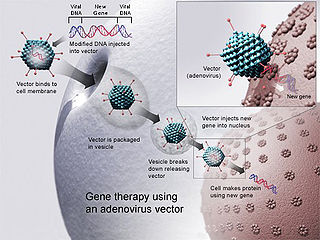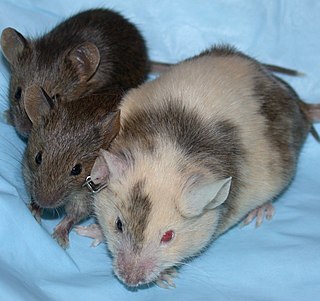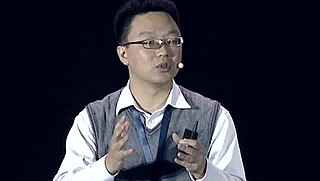
Gene therapy is a medical technology that aims to produce a therapeutic effect through the manipulation of gene expression or through altering the biological properties of living cells.

Human genetic enhancement or human genetic engineering refers to human enhancement by means of a genetic modification. This could be done in order to cure diseases, prevent the possibility of getting a particular disease, to improve athlete performance in sporting events, or to change physical appearance, metabolism, and even improve physical capabilities and mental faculties such as memory and intelligence. These genetic enhancements may or may not be done in such a way that the change is heritable.

A designer baby is a baby whose genetic makeup has been selected or altered, often to exclude a particular gene or to remove genes associated with disease. This process usually involves analysing a wide range of human embryos to identify genes associated with particular diseases and characteristics, and selecting embryos that have the desired genetic makeup; a process known as preimplantation genetic diagnosis. Screening for single genes is commonly practiced, and polygenic screening is offered by a few companies. Other methods by which a baby's genetic information can be altered involve directly editing the genome before birth, which is not routinely performed and only one instance of this is known to have occurred as of 2019, where Chinese twins Lulu and Nana were edited as embryos, causing widespread criticism.

CRISPR is a family of DNA sequences found in the genomes of prokaryotic organisms such as bacteria and archaea. These sequences are derived from DNA fragments of bacteriophages that had previously infected the prokaryote. They are used to detect and destroy DNA from similar bacteriophages during subsequent infections. Hence these sequences play a key role in the antiviral defense system of prokaryotes and provide a form of acquired immunity. CRISPR is found in approximately 50% of sequenced bacterial genomes and nearly 90% of sequenced archaea.

Gene targeting is a biotechnological tool used to change the DNA sequence of an organism. It is based on the natural DNA-repair mechanism of Homology Directed Repair (HDR), including Homologous Recombination. Gene targeting can be used to make a range of sizes of DNA edits, from larger DNA edits such as inserting entire new genes into an organism, through to much smaller changes to the existing DNA such as a single base-pair change. Gene targeting relies on the presence of a repair template to introduce the user-defined edits to the DNA. The user will design the repair template to contain the desired edit, flanked by DNA sequence corresponding (homologous) to the region of DNA that the user wants to edit; hence the edit is targeted to a particular genomic region. In this way Gene Targeting is distinct from natural homology-directed repair, during which the ‘natural’ DNA repair template of the sister chromatid is used to repair broken DNA. The alteration of DNA sequence in an organism can be useful in both a research context – for example to understand the biological role of a gene – and in biotechnology, for example to alter the traits of an organism.

Genome editing, or genome engineering, or gene editing, is a type of genetic engineering in which DNA is inserted, deleted, modified or replaced in the genome of a living organism. Unlike early genetic engineering techniques that randomly inserts genetic material into a host genome, genome editing targets the insertions to site-specific locations. The basic mechanism involved in genetic manipulations through programmable nucleases is the recognition of target genomic loci and binding of effector DNA-binding domain (DBD), double-strand breaks (DSBs) in target DNA by the restriction endonucleases, and the repair of DSBs through homology-directed recombination (HDR) or non-homologous end joining (NHEJ).

Jennifer Anne Doudna is an American biochemist who has done pioneering work in CRISPR gene editing, and made other fundamental contributions in biochemistry and genetics. Doudna was one of the first women to share a Nobel in the sciences. She received the 2020 Nobel Prize in Chemistry, with Emmanuelle Charpentier, "for the development of a method for genome editing." She is the Li Ka Shing Chancellor's Chair Professor in the department of chemistry and the department of molecular and cell biology at the University of California, Berkeley. She has been an investigator with the Howard Hughes Medical Institute since 1997.

Cas9 is a 160 kilodalton protein which plays a vital role in the immunological defense of certain bacteria against DNA viruses and plasmids, and is heavily utilized in genetic engineering applications. Its main function is to cut DNA and thereby alter a cell's genome. The CRISPR-Cas9 genome editing technique was a significant contributor to the Nobel Prize in Chemistry in 2020 being awarded to Emmanuelle Charpentier and Jennifer Doudna.

Emmanuelle Marie Charpentier is a French professor and researcher in microbiology, genetics, and biochemistry. As of 2015, she has been a director at the Max Planck Institute for Infection Biology in Berlin. In 2018, she founded an independent research institute, the Max Planck Unit for the Science of Pathogens. In 2020, Charpentier and American biochemist Jennifer Doudna of the University of California, Berkeley, were awarded the Nobel Prize in Chemistry "for the development of a method for genome editing". This was the first science Nobel Prize ever won by two women only.

Editas Medicine, Inc.,, is a clinical-stage biotechnology company which is developing therapies for rare diseases based on CRISPR gene editing technology. Editas headquarters is located in Cambridge, Massachusetts and has facilities in Boulder, Colorado.
J. Keith Joung is an American pathologist and molecular biologist who holds the Robert B. Colvin Endowed Chair in Pathology at Massachusetts General Hospital and is Professor of Pathology at Harvard Medical School. He is a leading figure in the field of genome editing and has pioneered the development of designer nucleases and sensitive off-target detection methods.

Intellia Therapeutics, Inc. is an American clinical-stage biotechnology company focused on developing novel, potentially curative therapeutics leveraging CRISPR-based technologies. The company's in vivo programs use intravenously administered CRISPR as the therapy, in which the company's proprietary delivery technology enables highly precise editing of disease-causing genes directly within specific target tissues. Intellia's ex vivo programs use CRISPR to create the therapy by using engineered human cells to treat cancer and autoimmune diseases.
Alexander Marson is an American biologist and infectious disease doctor who specializes in genetics, human immunology, and genome engineering. He is the Director of the Gladstone-UCSF Institute of Genomic Immunology, and a tenured Professor with a dual appointment in the Department of Medicine and the Department of Microbiology & Immunology at the University of California, San Francisco (UCSF).

Lei "Stanley" Qi is an associate professor in the department of bioengineering, and the department of chemical and systems biology at Stanford University. Qi led the development of the first catalytically dead Cas9 lacking endonuclease activity (dCas9), which is the basis for CRISPR interference (CRISPRi). His laboratory subsequently developed CRISPR-Genome Organization (CRISPR-GO).

The He Jiankui affair is a scientific and bioethical controversy concerning the use of genome editing following its first use on humans by Chinese scientist He Jiankui, who edited the genomes of human embryos in 2018. He became widely known on 26 November 2018 after he announced that he had created the first human genetically edited babies. He was listed in Time magazine's 100 most influential people of 2019. The affair led to ethical and legal controversies, resulting in the indictment of He and two of his collaborators, Zhang Renli and Qin Jinzhou. He eventually received widespread international condemnation.

He Jiankui is a Chinese biophysicist who was an associate professor in the Department of Biology of the Southern University of Science and Technology (SUSTech) in Shenzhen, China. Earning his Ph.D. from Rice University in Texas on protein evolution, including that of CRISPR, He learned gene-editing techniques (CRISPR/Cas9) as a postdoctoral researcher at Stanford University in California.

CRISPR gene editing standing for "Clustered Regularly Interspaced Short Palindromic Repeats" is a genetic engineering technique in molecular biology by which the genomes of living organisms may be modified. It is based on a simplified version of the bacterial CRISPR-Cas9 antiviral defense system. By delivering the Cas9 nuclease complexed with a synthetic guide RNA (gRNA) into a cell, the cell's genome can be cut at a desired location, allowing existing genes to be removed and/or new ones added in vivo.

CRISPR Therapeutics AG is a Swiss–American biotechnology company headquartered in Zug, Switzerland. It was one of the first companies formed to utilize the CRISPR gene editing platform to develop medicines for the treatment of various rare and common diseases. The company has approximately 500 employees and has offices in Zug, Switzerland, Boston, Massachusetts, San Francisco, California and London, United Kingdom. Its manufacturing facility in Framingham, Massachusetts won the Facilities of the Year Award (FOYA) award in 2022. The company’s lead program, exagamglogene autotemcel, or exa-cel, was granted regulatory approval by the US Food and Drug Administration (FDA) in December 2023.
Mammoth Biosciences is a biotechnology company based in Brisbane, California developing diagnostic tests using CRISPR-Cas12a and CRISPR-based therapies using its proprietary ultra-small CRISPR systems. Several CRISPR-Cas systems identified through the company's metagenomics-based protein discovery platform, including members of the Casφ and Cas14 families of CRISPR-associated enzymes, have demonstrated potential for therapeutic genome editing in in vivo settings.
Basem Al-Shayeb is a researcher at the Innovative Genomics Institute. He led the discovery of the largest known bacteriophages, the smallest CRISPR gene editing systems, and Borgs in methane-oxidizing archaea. He was named Forbes 30 Under 30 and Arab America's 30 Under 30.














